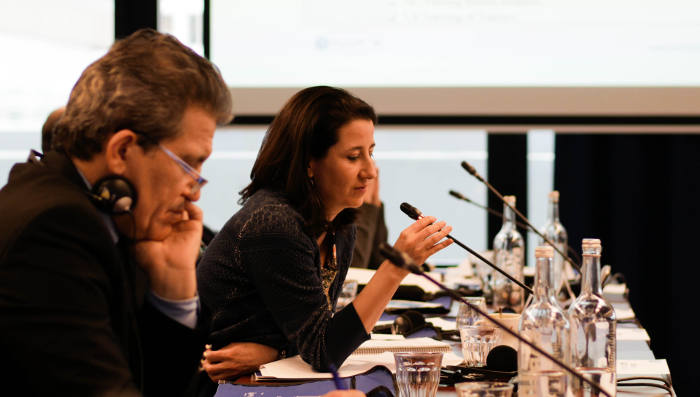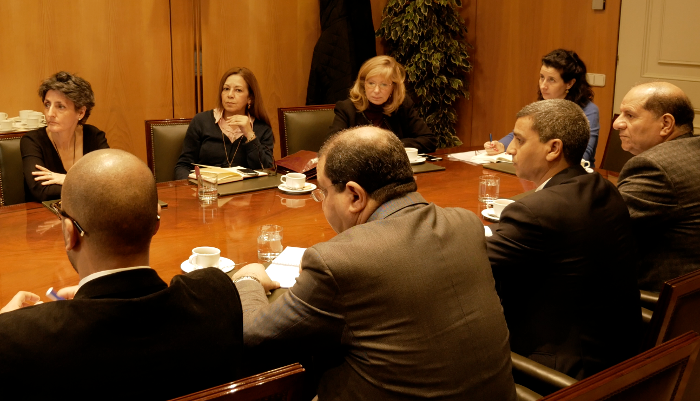-
28 July 2017
Category : Interview
Inmaculada Aguado, collaborating with FIIAPP for over 10 years
We talk to Inmaculada Aguado about her work in the Ministry of Justice supporting the international cooperation projects managed by FIIAPP
 Inmaculada Aguado at the kick-off event for EUROMED Justice IV
Inmaculada Aguado at the kick-off event for EUROMED Justice IVInmaculada Aguado is the Head of the Support Unit for the Director General of International Cooperation in Spain’s Ministry of Justice. Her collaboration with FIIAPP goes back a long way, since 2005. Up to now she has been responsible for coordinating numerous justice-related international cooperation projects managed by FIIAPP.
Currently her work is focussed on a wide variety of tasks of an institutional nature, such as preparation for visits by foreign delegations wanting to learn about the Spanish experience in the context of justice, negotiation of collaboration agreements with other countries, as well as coordination of the Ministry of Justice’s participation in international projects.
What is the work of the Ministry of Justice in international cooperation?
When we speak of international cooperation in the context of justice, it’s important to differentiate very clearly between international legal cooperation and international development cooperation. With respect to the former, international legal cooperation, it should be noted that legal assistance between countries is essential in a globalised world in which court proceedings increasingly have an extra-territorial component and, therefore, require the collaboration of various countries’ authorities for the prosecution of criminal suspects.
And with respect to international development cooperation, this involves the participation of the Ministry of Justice in justice-related projects with countries with which we have very special relationships. These projects may have very distinct purposes: supporting legislative reforms of criminal codes; the training of judges and prosecutors; the modernisation of justice systems; the creation of courts specialised in certain subjects, such as gender-based violence, etc.
What is the relationship between the Ministry of Justice and European Unión External Action policies?
At the Ministry of Justice of Spain, we follow the guidelines given to us by our Ministry of Foreign Affairs and Cooperation, which in turn aligns itself with EU External Action policies, and we support the strengthening of the rule of law in the countries considered high-priority for Spain. These includes the Ibero-American countries, European countries that aspire to EU membership (the Balkans and Turkey) and the countries whose stability is in our interest, such as those of North Africa, as they are our southern neighbours, and our security depends on their stability and development.
What matter do the justice projects that FIIAPP collaborates in address?

Inmaculada Aguado in a meeting in Spain with representatives of the Tunisian Ministry of Justice Currently the Ministry of Justice is participating by leading two Twinning projects with Tunisia and Turkey.
The project with Tunisia’s Ministry of Justice aims to support that ministry in adapting its organisation and operations to the new challenges it is facing, as following the 2011 Revolution it must enact reforms that affect the rule of law following approval of the Constitution of 2014.
We also have another project with the Turkish Ministry of Justice and legal profession to support them in improving their public defence system, in which we are also collaborating with the bar associations of Barcelona, Madrid and Valencia.
Both projects include the participation of ministry employees, judges, prosecutors, justice administration attorneys and lawyers who travel to Tunisia or Turkey for a week to work and share good practices with their Tunisian and Turkish colleagues. We implement these projects in collaboration with other countries, in the case of Tunisia with Italy, and in the case of Turkey with Lithuania and France.
In the time you have been collaborating in this type of projects, have you seen an evolution in cooperation projects?
Cooperation projects are becoming increasingly ambitious and in, the case of those I typically handle, these are projects that aim to support institutional changes in the countries where we work.
To contribute to real changes, the Spanish experts hold positions of responsibility in the corresponding institutions in Spain, as justice ministry professionals are the people who know how to propose improvements to other countries because they have had to make these reforms. And so they are increasingly asking for more specialised people who know their technical working area (for example, judge training) and also have certain skills for working in different cultural environments and often in another language.
What are the challenges facing justice in a globalised world?
In a globalised world in which borders no longer exist, not even for criminals, justice administration faces the challenge of finding new mechanisms for fighting new types of crimes, such as cybercrime offenses, as well as those associated with organised crime and terrorism.
To combat these crimes, harmonisation of legislation is necessary, a task that corresponds to the justice ministries, but also collaboration between all professionals working in every part of the criminal justice system, whether at the operative level, through police investigation, or in the prosecution phase, which is the responsibility of prosecutors and judges.
The views and opinions expressed in this blog are the sole responsibility of the person who write them.






